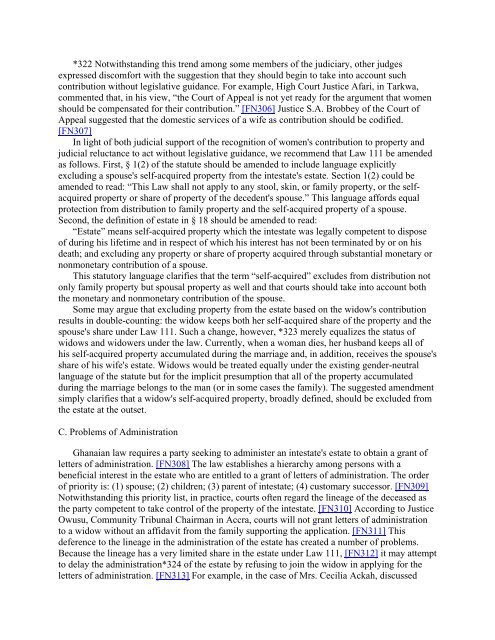Law, Culture and Women's Inheritance Rights in ... - Leitner Center
Law, Culture and Women's Inheritance Rights in ... - Leitner Center
Law, Culture and Women's Inheritance Rights in ... - Leitner Center
You also want an ePaper? Increase the reach of your titles
YUMPU automatically turns print PDFs into web optimized ePapers that Google loves.
*322 Notwithst<strong>and</strong><strong>in</strong>g this trend among some members of the judiciary, other judges<br />
expressed discomfort with the suggestion that they should beg<strong>in</strong> to take <strong>in</strong>to account such<br />
contribution without legislative guidance. For example, High Court Justice Afari, <strong>in</strong> Tarkwa,<br />
commented that, <strong>in</strong> his view, “the Court of Appeal is not yet ready for the argument that women<br />
should be compensated for their contribution.” [FN306] Justice S.A. Brobbey of the Court of<br />
Appeal suggested that the domestic services of a wife as contribution should be codified.<br />
[FN307]<br />
In light of both judicial support of the recognition of women's contribution to property <strong>and</strong><br />
judicial reluctance to act without legislative guidance, we recommend that <strong>Law</strong> 111 be amended<br />
as follows. First, § 1(2) of the statute should be amended to <strong>in</strong>clude language explicitly<br />
exclud<strong>in</strong>g a spouse's self-acquired property from the <strong>in</strong>testate's estate. Section 1(2) could be<br />
amended to read: “This <strong>Law</strong> shall not apply to any stool, sk<strong>in</strong>, or family property, or the selfacquired<br />
property or share of property of the decedent's spouse.” This language affords equal<br />
protection from distribution to family property <strong>and</strong> the self-acquired property of a spouse.<br />
Second, the def<strong>in</strong>ition of estate <strong>in</strong> § 18 should be amended to read:<br />
“Estate” means self-acquired property which the <strong>in</strong>testate was legally competent to dispose<br />
of dur<strong>in</strong>g his lifetime <strong>and</strong> <strong>in</strong> respect of which his <strong>in</strong>terest has not been term<strong>in</strong>ated by or on his<br />
death; <strong>and</strong> exclud<strong>in</strong>g any property or share of property acquired through substantial monetary or<br />
nonmonetary contribution of a spouse.<br />
This statutory language clarifies that the term “self-acquired” excludes from distribution not<br />
only family property but spousal property as well <strong>and</strong> that courts should take <strong>in</strong>to account both<br />
the monetary <strong>and</strong> nonmonetary contribution of the spouse.<br />
Some may argue that exclud<strong>in</strong>g property from the estate based on the widow's contribution<br />
results <strong>in</strong> double-count<strong>in</strong>g: the widow keeps both her self-acquired share of the property <strong>and</strong> the<br />
spouse's share under <strong>Law</strong> 111. Such a change, however, *323 merely equalizes the status of<br />
widows <strong>and</strong> widowers under the law. Currently, when a woman dies, her husb<strong>and</strong> keeps all of<br />
his self-acquired property accumulated dur<strong>in</strong>g the marriage <strong>and</strong>, <strong>in</strong> addition, receives the spouse's<br />
share of his wife's estate. Widows would be treated equally under the exist<strong>in</strong>g gender-neutral<br />
language of the statute but for the implicit presumption that all of the property accumulated<br />
dur<strong>in</strong>g the marriage belongs to the man (or <strong>in</strong> some cases the family). The suggested amendment<br />
simply clarifies that a widow's self-acquired property, broadly def<strong>in</strong>ed, should be excluded from<br />
the estate at the outset.<br />
C. Problems of Adm<strong>in</strong>istration<br />
Ghanaian law requires a party seek<strong>in</strong>g to adm<strong>in</strong>ister an <strong>in</strong>testate's estate to obta<strong>in</strong> a grant of<br />
letters of adm<strong>in</strong>istration. [FN308] The law establishes a hierarchy among persons with a<br />
beneficial <strong>in</strong>terest <strong>in</strong> the estate who are entitled to a grant of letters of adm<strong>in</strong>istration. The order<br />
of priority is: (1) spouse; (2) children; (3) parent of <strong>in</strong>testate; (4) customary successor. [FN309]<br />
Notwithst<strong>and</strong><strong>in</strong>g this priority list, <strong>in</strong> practice, courts often regard the l<strong>in</strong>eage of the deceased as<br />
the party competent to take control of the property of the <strong>in</strong>testate. [FN310] Accord<strong>in</strong>g to Justice<br />
Owusu, Community Tribunal Chairman <strong>in</strong> Accra, courts will not grant letters of adm<strong>in</strong>istration<br />
to a widow without an affidavit from the family support<strong>in</strong>g the application. [FN311] This<br />
deference to the l<strong>in</strong>eage <strong>in</strong> the adm<strong>in</strong>istration of the estate has created a number of problems.<br />
Because the l<strong>in</strong>eage has a very limited share <strong>in</strong> the estate under <strong>Law</strong> 111, [FN312] it may attempt<br />
to delay the adm<strong>in</strong>istration*324 of the estate by refus<strong>in</strong>g to jo<strong>in</strong> the widow <strong>in</strong> apply<strong>in</strong>g for the<br />
letters of adm<strong>in</strong>istration. [FN313] For example, <strong>in</strong> the case of Mrs. Cecilia Ackah, discussed


